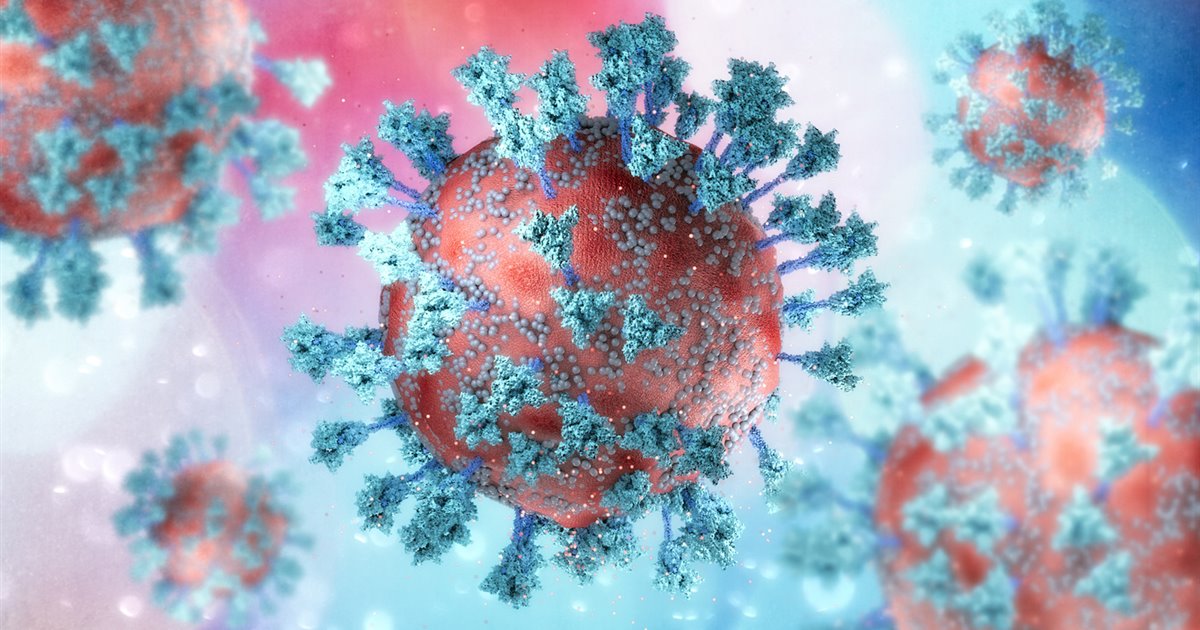International
What is known about the new coronavirus variants under surveillance in the Americas?

August 28|
The Pan American Health Organization (PAHO) has recently published a technical note on two variants of Omicron, descendants of the coronavirus, which have been under scrutiny in recent months.
These are the variants known scientifically as EG.5 and BA.2.86 and, to date, the findings suggest that, despite their presence, there appears to be no significant change in their impact on public health.
EG.5, the variant that put scientists on alert
EG.5, a variant derived from XBB.1.9.2 (itself from Omicron), was first detected in February 2023. But it was only last August 9 that health authorities classified it as a “Variant of Interest” (VOI). The PAHO report notes that there has been a steady increase in the proportion of reported EG.5 infections worldwide, and that countries such as Canada, Colombia, Costa Rica, the United States and the Dominican Republic have also noted this trend. However, so far, no significant changes in disease severity related to this sublineage have been detected.
BA.2.86, variant under surveillance
BA.2.86 initially emerged in a sample taken in Denmark at the end of July 2023. Although it has been detected in other regions, only a total of seven sequences have been reported to date. The World Health Organization (WHO) classified it as a variant under surveillance on August 17 because it has a considerable number of mutations in the genes of the virus spicule.
So far, the available evidence on BA.2.86 is limited, which has led PAHO to indicate that “initial risk assessment will be generated shortly”. This suggests that more research is needed to better understand its transmission capacity, its ability to evade immune response and its potential severity.
Public health risk alert
PAHO has assessed the public health risk posed by EG.5 as low and comparable to that of other currently circulating variants of concern. However, the outlook for BA.2.86 is still under evaluation, underscoring the importance of maintaining constant vigilance on these emerging variants.
PAHO together with the World Health Organization (WHO) have reiterated that the recommendations to combat the spread of COVID-19 remain unchanged. In addition, it has urged all countries in the region to continue to collect representative samples for sequencing and to maintain adequate genomic surveillance of SARS-CoV-2. This is essential as the virus continues to circulate and evolve.
WHO warns that many countries are underreporting new cases
Maria Van Kerkhove, WHO technical lead for COVID-19 issues, has reported that the EG.5 variant of the Omicron virus has a higher transmission capacity, but does not appear to be more severe than other variants.
In Van Kerkhove’s words, “we did not detect a change in the severity of the EG.5 variant compared to other Omicron sublineages that have been circulating since late 2021.” This suggests that, despite its increased ability to transmit, the EG.5 variant does not appear to cause a more severe form of the disease compared to other previously identified Omicron variants.
For his part, WHO director general Tedros Adhanom Ghebreyesus expressed concern that many countries were not reporting COVID-19-related data to WHO. He said that only 11% of countries had reported on hospitalizations and intensive care unit (ICU) admissions related to the virus.
In response to this situation, WHO issued a set of standing recommendations for COVID-19. In these recommendations, it urged countries to continue to report data on COVID-19, especially mortality and morbidity data, and to continue to offer vaccination.
Maria Van Kerkhove emphasized that the lack of data from many countries is hampering efforts to combat the virus. “About a year ago, we were in a much better situation to anticipate, act or be more agile. And now, the delay in our ability to do that is growing. And our ability to do so is decreasing,” he stressed.
The situation in the Americas
According to data provided by WHO, the health agency responsible for monitoring the evolution of the coronavirus worldwide, the last month has seen an alarming increase in the number of new cases of COVID-19, with more than 1.4 million new cases reported, representing a 63% increase compared to the previous period.
However, there has been a 56% decrease in the number of deaths during the same period. These data underscore the continued need to maintain stringent control and surveillance measures.
However, they stress that as the SARS-CoV-2 virus continues to evolve, it is essential to maintain constant monitoring of emerging variants such as EG.5 and BA.2.86.
Although the risks appear to be low at this time, the situation may change, and it is vital to follow the recommendations of public health authorities and maintain active surveillance to ensure an effective response to the ongoing pandemic.
International
Florida judge sets 2027 trial in Trump’s $10 billion lawsuit against BBC

A federal judge in Florida has scheduled February 2027 for the trial in the lawsuit filed by U.S. President Donald Trump against the BBC, in which he is seeking $10 billion in damages for defamation.
Trump accuses the British broadcaster of airing a misleading edit of a speech he delivered on January 6, 2021, which, he says, made it appear that he explicitly urged his supporters to attack the U.S. Capitol in Washington.
The president filed the suit in December in federal court in Florida, alleging defamation and violations of a law governing business practices when the program was broadcast ahead of the 2024 election.
Trump is seeking $5 billion in damages for each of the two claims.
Lawyers for the BBC unsuccessfully asked the court to dismiss the case, arguing that Trump had not suffered a “legally recognizable harm,” since the investigative program Panorama, which included the edited footage, aired outside the United States.
International
Head-of-state diplomacy key to guiding China–U.S. ties, Beijing says

Head-of-state diplomacy plays an irreplaceable strategic guiding role in China–United States relations, Chinese Foreign Ministry spokesperson Lin Jian said on Thursday during a regular press briefing, when asked about high-level exchanges between the two sides.
Lin added that in a recent phone call, U.S. President Donald Trump once again expressed his intention to visit China in April, while Chinese President Xi Jinping reiterated his invitation.
Both sides remain in communication regarding the matter, the spokesperson said.
Lin noted that the essence of China–U.S. economic and trade ties lies in mutual benefit and win-win outcomes.
“Both parties should work together to implement the important consensus reached by the two heads of state, injecting greater certainty and stability into China–U.S. economic and trade cooperation, as well as into the global economy,” he said.
International
Trump administration to end special immigration operation in Minnesota

The administration of Donald Trump is bringing to a close its special operation targeting illegal immigration in the northern state of Minnesota, border czar Tom Homan announced Thursday, following weeks of unrest and the fatal shootings of two activists by federal agents.
Thousands of federal officers had been deployed to Minnesota in December to carry out large-scale raids against undocumented immigrants.
The operations triggered strong reactions from residents and advocacy groups, leading to daily confrontations and the deaths of two people who were shot by federal agents.
“I proposed, and President Trump agreed, that this special operation should end in Minnesota,” Homan said during a press conference in the state capital, Minneapolis.
“A significant drawdown began this week and will continue into next week,” he added.
Homan indicated that similar enforcement efforts could be launched in other cities.
“Next week we will redeploy the agents currently here back to their home stations or to other parts of the country where they are needed. But we will continue to enforce immigration laws,” he said.
-

 Central America4 days ago
Central America4 days agoGuatemala isolates Barrio 18 leader after attacks that killed 11 police
-

 International2 days ago
International2 days agoU.S. Health Department says CDC grants no longer match agency priorities
-

 International1 day ago
International1 day agoOver 50 Civil Groups Urge House to Impeach DHS Secretary Kristi Noem
-

 International2 days ago
International2 days agoICE Arrests Reach 379,000 Under Trump, Testimony Shows Amid Minnesota Shootings
-

 Central America1 day ago
Central America1 day agoGuatemala to Phase Out Longstanding Medical Cooperation Agreement with Cuba
-

 International2 days ago
International2 days agoDespite homicide drop, overall deadly violence remains high in Mexico: study
-

 International2 days ago
International2 days agoSheinbaum Urges Mexico to ‘Jealously’ Guard Sovereignty at Air Force Anniversary
-

 International2 days ago
International2 days agoMEPs Approve Plan That Could Fast-Track Rejection of Some Asylum Claims
-

 International2 days ago
International2 days agoJet Fuel Crisis Hits Cuba: Flights Disrupted, Air Canada Cancels Services
-

 International1 day ago
International1 day agoNew York’s New Archbishop Names Óscar Romero as His Favorite Saint
-

 International2 days ago
International2 days agoMexico Rises Slightly to 141st in Global Corruption Perceptions Index 2025
-

 International7 hours ago
International7 hours agoHead-of-state diplomacy key to guiding China–U.S. ties, Beijing says
-

 International7 hours ago
International7 hours agoTrump administration to end special immigration operation in Minnesota
-

 International7 hours ago
International7 hours agoFlorida judge sets 2027 trial in Trump’s $10 billion lawsuit against BBC
-

 International1 day ago
International1 day agoExclusive Tucson Neighborhood Shaken by Disappearance of Savannah Guthrie’s Mother
-

 International2 days ago
International2 days agoChile Unveils Latam-GPT to Give Latin America Its Own AI Model


























